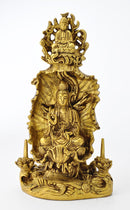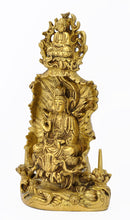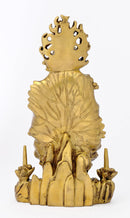Specification
- Product Code :5605
- Material :Brass
- Size :9.50"H x 5"W x 3"D
- Weight :2.250
Description
Here the Goddess Kuan Yin is seen with Amitabha Buddha. In Sanskrit, this Chinese deity is called Padma-pâni, or 'Born of the Lotus'. Quan Yin, alone among Buddhist gods, is loved rather than feared and is the model of Chinese beauty. She is regarded by the Chinese as the goddess of mercy and was originally male until the early part of the 12th century and has evolved since that time from her prototype, Avalokiteshvara, "the merciful lord of utter enlightenment,". Avalokiteshvara is an Indian bodhisattva, who chose to remain on earth to bring relief to the suffering rather than enjoy for himself the ecstasies of Nirvana. Quan Yin was a Buddhist who through great love and sacrifice during life, had earned the right to enter Nirvana after death. However, like Avlokiteshvara, while standing before the gates of Paradise she heard a cry of anguish from the earth below. Turning back to earth, she renounced her reward of bliss eternal but in its place found immortality in the hearts of the suffering. In China she has many names and is also known as "great mercy, great pity; salvation from misery, salvation from woe; self-existent; thousand arms and thousand eyes," etc.
For centuries, Kuan Yin has epitomized the great ideal of Mahayana Buddhism in her role as "bodhisattva --literally "a being of bodhi, or enlightenment," who is destined to become a Buddha but has foregone the bliss of Nirvana with a vow to save all children of God.
Quan Yin carries the Goddess and Divine Mother aspect of Buddhism. The same Goddess and Divine energy carried by the Virgin Mary in Christianity. In the Egyptian mysteries it is carried by Isis. In Hinduism it is carried by Shakti, wife of Vishnu, by Parvarti, wife of Shiva, by Radha, wife of Krishna, and by Sita, wife of Rama.
Description
Specification
- Product Code :5605
- Material :Brass
- Size :9.50"H x 5"W x 3"D
- Weight :2.250
Description
Here the Goddess Kuan Yin is seen with Amitabha Buddha. In Sanskrit, this Chinese deity is called Padma-pâni, or 'Born of the Lotus'. Quan Yin, alone among Buddhist gods, is loved rather than feared and is the model of Chinese beauty. She is regarded by the Chinese as the goddess of mercy and was originally male until the early part of the 12th century and has evolved since that time from her prototype, Avalokiteshvara, "the merciful lord of utter enlightenment,". Avalokiteshvara is an Indian bodhisattva, who chose to remain on earth to bring relief to the suffering rather than enjoy for himself the ecstasies of Nirvana. Quan Yin was a Buddhist who through great love and sacrifice during life, had earned the right to enter Nirvana after death. However, like Avlokiteshvara, while standing before the gates of Paradise she heard a cry of anguish from the earth below. Turning back to earth, she renounced her reward of bliss eternal but in its place found immortality in the hearts of the suffering. In China she has many names and is also known as "great mercy, great pity; salvation from misery, salvation from woe; self-existent; thousand arms and thousand eyes," etc.
For centuries, Kuan Yin has epitomized the great ideal of Mahayana Buddhism in her role as "bodhisattva --literally "a being of bodhi, or enlightenment," who is destined to become a Buddha but has foregone the bliss of Nirvana with a vow to save all children of God.
Quan Yin carries the Goddess and Divine Mother aspect of Buddhism. The same Goddess and Divine energy carried by the Virgin Mary in Christianity. In the Egyptian mysteries it is carried by Isis. In Hinduism it is carried by Shakti, wife of Vishnu, by Parvarti, wife of Shiva, by Radha, wife of Krishna, and by Sita, wife of Rama.
Payment & Security
Your payment information is processed securely. We do not store credit card details nor have access to your credit card information.






